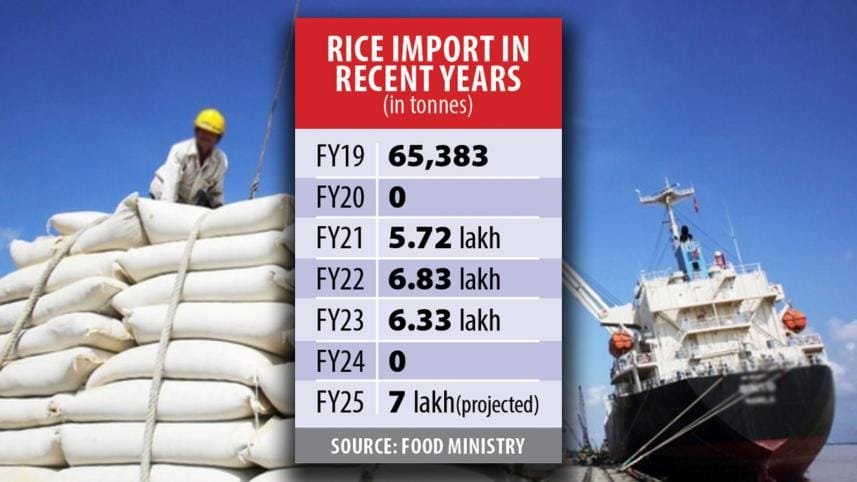Rice imports to hit seven-year high

The interim government is set to import seven lakh tonnes of rice, the highest in the last seven fiscal years, as it looks to shore up its depleting food grain stock and ease the cost of living crisis for the low- and fixed-income people battered by the prolonged high inflation.
"The cost of living has increased due to various reasons in the last few years, and in the meantime, due to natural disasters, the price of rice in the market is high," Food Adviser Ali Imam Majumder told The Daily Star.
Inflation averaged 10.87 percent in the first half of fiscal 2024-25, shows data from the Bangladesh Bureau of Statistics.
"Therefore, this decision has been taken to relieve people from suffering to some extent," he said, adding that the rice would be imported from several countries this fiscal year.
It was initially estimated that about 10 lakh tonnes of rice would need to be imported. Later, it was revised down to seven lakh tonnes, The Daily Star has learnt from food ministry officials involved with the proceedings.
Currently, the process of importing 5.50 lakh tonnes of rice is underway. Of this, 3 lakh tonnes will be imported through an open tender process.
The government has finalised plans to import 100,000 tonnes of rice from Myanmar on a government-to-government arrangement.
The first consignment of 27,000 tonnes has already reached the country, and another shipment will arrive later this month, Majumder said.
From Pakistan, 50,000 tonnes of rice will be imported through the G2G method.
A decision has also been made to import 1 lakh tonnes of rice from Vietnam via the G2G method, with necessary arrangements nearing completion.
The private sector businesspeople have shown interest in importing rice due to the zero tariff on rice imports for the private sector, Majumder said.
The move comes at a time when the the price of fine rice has risen by 4.05 percent in the past month, medium-grain rice by 3.31 percent and coarse rice by 6.67 percent.
And in the past year, the price of fine rice has increased by 12.41 percent, medium-grain rice by 15.74 percent and coarse rice by 9.80 percent.
Fine rice is selling for Tk 70 to Tk 84 per kg, coarse rice for Tk 54-58 per kg, and medium-grain rice for Tk 60-65 per kg, according to data from the Trading Corporation of Bangladesh.
Two consecutive floods in August and October last year damaged about three lakh hectares of cropland, according to a US Department of Agriculture report published in the third week of December.
Rice production may fall in the current marketing year of 2024-25, which began in May last year, due to the reduction in the acreage of Aman season paddy, the report added.
Currently, there is a satisfactory stock of rice in the country and necessary measures have been taken to prevent any future shortages, Majumder said.
On January 12, the public stock of food grains stood at 12.25 lakh tonnes, including 8.2 lakh tonnes of rice, down 25 percent year-on-year.
The government's initiative to import rice, both at the government and private levels, is a positive step towards bringing down the rice prices and alleviating people's suffering, said Mohammad Jahangir Alam, a professor in the Department of Agribusiness and Marketing at Bangladesh Agricultural University.
However, he emphasized the need for a comprehensive analysis to determine whether the price hike is solely due to a supply shortage or if there are other factors.
"Because, the upward trend in rice prices appears to be beyond control."
Alam also highlighted the importance of considering transportation costs when importing rice.
"If rice is sourced from distant countries, transportation costs will rise, which could lead to higher prices for consumers. Therefore, priority should be given to importing from countries that minimise transportation expenses."
He cautioned that excessive imports beyond the country's demand could adversely affect local farmers, urging the government to carefully balance imports with domestic production.
"The impact on farmers should not be overlooked," he added.





 For all latest news, follow The Daily Star's Google News channel.
For all latest news, follow The Daily Star's Google News channel.
Comments